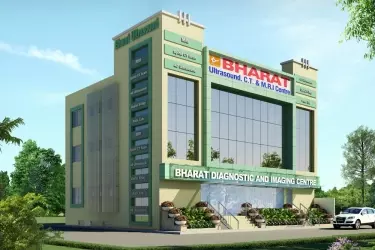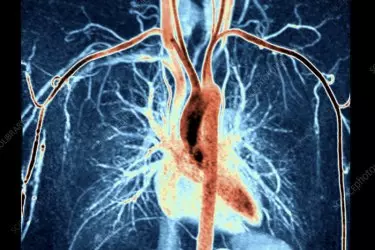
Angiography is the study of blood vessles in the human body. The body has blood vessels in the form of arteries and veins. Apart from the main blood vessles, there are many smaller vessels called secondaries. These blood vessles can have blockages inside them or aneurysms which can be life threatening. The Angiography of the blood vessles can be done either invasively on a Cath Lab or non-invasively on CT Scan or MRI. In angiography study the blood flowing inside the vessels has to be scanned. This becomes possible only with the use of a contrast medium containing iodine as iodine is the only liquid which is radio-opaque. Patients who have deranged kidney function cannot be given this contrast. For such patients there is no other choice but to go for non-contrast MR Angiography. The results of non-contrast MR Angiography have been improving over the years and now match the results of contrast imaging on other modalities like CT Scan.
MR Angiography can be done to visualize the vessels of - Brain, Neck, Heart, Renal, Peripheral, Abdominal and Chest Region.
MR Angiography will detect any aneurysm in the blood vessles or plaques which cause blockages. Arteriovenous Malformation (AVM) or Pulmonary Embolism are also diagnosed on MR Angiography.
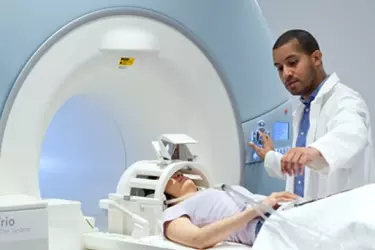
Non Contrast MR Angiography is done for the patients who have deranged kidney function and cannot undergo Contrast CT Scan as non-contrast MRI gives far more information than non-contrast CT Scan. However you would be asked to come for the test with four hours of fasting as contrast injection might be required in some cases. In MRI we use Gadonlinium contrast as compared to the Iodized Contrast in CT Scan which is less harmful for patients having poor kidney function. During the MRI exam, you would be in a room which has strong magnetic field. You should not be wearing any jewellery and should inform the technician if you have any kind of implant inside your body. In any case our technician would be checking you with a metal detector before taking you inside the magnet room.
You are advised to leave your mobile phone, wallet and all clothes inside a locker which is provided to you. You would be given a hospital gown to wear for the test. There is a humming sound which resembles the sound of a running train while the exam is going on. You would be given ear plugs to minimize this sound. You would be required to go inside a cylinderical tunnel and lie still while the exam is going on. On completion of the test, you can change into your own clothes and leave for your home. The MRI Angiography exam will produce several hundred images which will be reviewed by the radiologist and the report would be made available within 24 hours of the scanning.
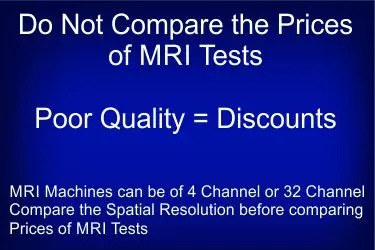
MRI Machines are of two types - Permanent Magnet and Superconducting Magnet. The Permanent Magnet MRI or Open MRI as it is called comes in two strengths - 0.2 Tesla and 0.3 Tesla. The Superconducting Magnet comes in strengths of 1.5 Tesla and 3.0 Tesla. Tesla is the unit for magnetic strength. The common belief is that higher the Tesla, better is the imaging quality but this is not the case. Higher magnetic strength can produce greater noise and result in lower signal to noise ratio. MRI of the Brain, Joints and Spine can be done equally well on a 0.3 Tesla Permanent Magnet as it is done on a 1.5 Tesla Magnet. However inner ear imaging is best done on a 3 Tesla MRI. Many doctors would prescribe MRI scan on a 3 Tesla Machine without knowing the difference in imaging quality. The quality of imaging also depends on the quality of coils, channels in the machine and specialized applications for doing the scanning. Finally the quality of reporting is of paramount importance in any MRI Imaging. At Bharat Diagnostics we have the optimum combination of all these factors. We have all types of machines at different centres. So patients who are claustrophobic, are advised to get their MRI on open magnet of 0.3 Tesla. Patients who require extensive testing like MRI brain and whole spine would do better to go for a 16 Channel MRI machine.
The cost of Non-contrast MR Angiography at our centres is in the range of Rs. 11000 - 14000. If contrast is needed then additional amount of Rs. 3500 - 6000 is charged for the test.
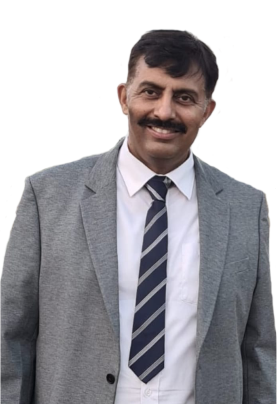
Dr Rajesh Choudhary has more than 20 years of experience in the field of Radiology. Dr Choudhary has been trained in the latest radiological techniques from Sardar Patel Medical College, Bikaner and PGI Chandigarh.

Dr Shruti Sangwan has been trained at Lady Hardinge Medical College, Maulana Azad Medical College, PGI Chandigarh and Artemis Hospital Bhiwadi in the field of Radiology and has more than 18 years of experience.
